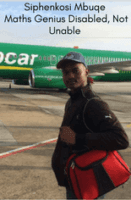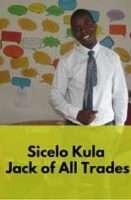South Africa celebrates Freedom Day on the 27th of April annually which ‘commemorates the day in 1994 when the first democratic election was held’. However, to some people ‘freedom’ means you’re free to inflict harm on other humans and get away with it.
Young Siphenkosi Mbuqe (now twenty-four) was only sixteen years old and having a jol with friends when he felt a hot bullet penetrating his chin, shattering his jaw – and leaving him speech-impaired in 2007.
“We were just having fun when this guy approached. He confronted me and asked why I was ‘staring’ at him … the next thing I remember was hearing people scream ‘Umdubule, umdubule (He shot him).’ I saw blood dripping down my chin,” Siphenkosi recollects the sad memory he’s been trying so hard to forget, opening his eyes wide to try to stop the tears from falling.
Siphenkosi was bizarrely rushed to the police station first, but his condition was too critical that the police sent him on to hospital.
“I was admitted on the 30th of June until sometime in July. My chin was so swollen that I couldn’t utter a single word. I had to wear braces on my teeth.”
If you thought lightning never strikes the same place twice, then you might want to reconsider. Just when Siphenkosi was still nursing his wounds, another tragic incident happened.
“I had just come back from the hospital. I went to visit [a friend] and on my way back I came across these guys. One of them asked me something I’d heard before. It was just like deja-vu. He asked – ‘what are you staring at?’ I didn’t see what was coming. He shot me in the head and all the lights went out. I was in a coma for a month,” he recalls. The shootings happened just a month apart, leaving his right side paralysed.
Neither perpetrator was ever brought to book because Siphenkosi’s family didn’t know them and he was unable to do anything.
“I couldn’t even lay charges cos I couldn’t even take myself to the loo, so they never got arrested. But rumour has it that both of them were shot dead. That didn’t mean anything to me because two wrongs don’t make a right. I never sought revenge or anything…”
The incidents happened in Nyanga, Cape Town, and his family decided to relocate to Delft where they currently stay.
“I started attending physiotherapy and I saw the improvement. Speech therapy also helped me regain my speech. Now I’m able to articulate words properly. My left hand still needs assistance when I’m lifting heavy things, but I’m able to operate it.”
Siphenkosi may have waited six years before returning to school, but he was surely six times wiser when he eventually went back.
“In 2013, my Occupational Therapist (OT) told me to go back to school. I wrote the assessment in Muizenberg and passed it. I was enrolled at False Bay College in Office Management and finished my level-four certificate in 2015. I scored 86% in Mathematics.”
Siphenkosi soon became the campus’ favourite, winning the hearts of many – including the ‘no-nonsense’ lecturers.
“I was named the ‘Campus Hero’ for being an outstanding student and a helping hand to other students. I didn’t allow my disability to keep me from helping others out. Most students would come to me and ask for help. I’d get home really late cos that was putting a lot of strain on my time, but I enjoyed it nevertheless. They’d come to me whenever they needed help.”
He says he’s right-handed but he had to learn to use his left hand after sustaining the injuries.
“My late friend used to mock me and say ‘You’re immortal. They’ll never kill you now. They must just forget it.’ At campus we had scribes during class tests and exams. A scribe is basically someone that writes for you and you just dictate your answers to them.”
Siphenkosi adds that, “Young people should never burn their bridges, because you never know when you might have to cross them again.”
“I still have a good relationship with my lecturers at False Bay. I’m still in constant communication with most of them. I had this lecturer who was a close friend but he never gave me preferential treatment, and that motivated me to work even harder.
“My friend Mark also played a huge role in my academic life, I’m grateful for everyone I met there.” He adds that the laptop he got at False Bay has helped him polish his computer skills.
Siphenkosi is currently job-hunting as his father’s passing means he has to close that wage gap.
“My father passed away in 2015 and I’m now the head of the house and should carry the responsibility of a breadwinner. My mom does work but she is going to retire soon, and I can’t just sit back in the meantime. I can’t sit down and moan about being disabled.”
Siphenkosi attributes his academic and health excellence to his mother and little sister, who’s a Cape Peninsula University of Technology (CPUT) student.
“My mom pushed me. She always told me I’d get back to normal and be like other children again. Sometimes she wasn’t sure if I was, but she never stopped believing.” He adds that he still desires to further his studies, as he spends most of his time at the library enlightening himself.
Perhaps it’s safe to say that Siphenkosi’s dreams may have been delayed but they’re not denied.
“I know there are people who are in a worse state than me. Some guys are in wheelchairs with no arms, but they never let that drive them away from their dreams. I can do everything without anyone’s help and that only means nothing will hold me back. I draw strength from seeing others soldier on. Perseverance is the key. Nothing comes easy in life,” he concludes.





